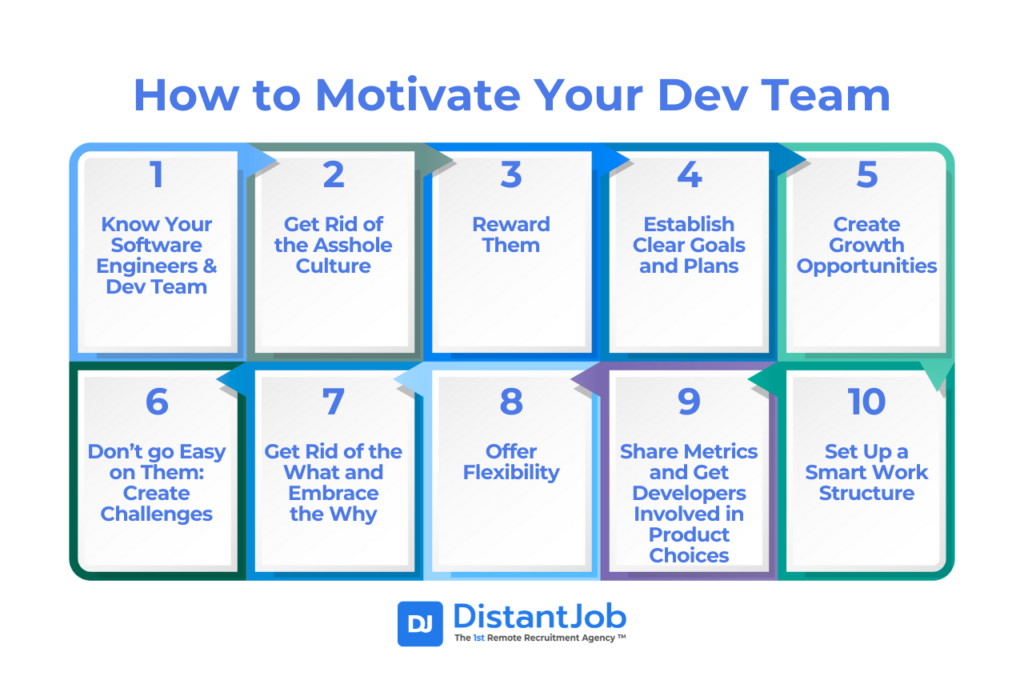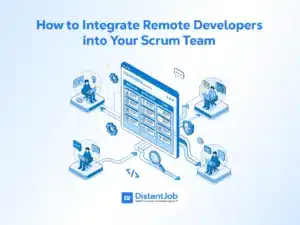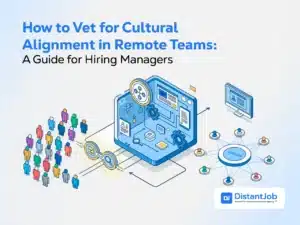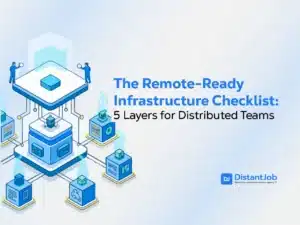Boosting software engineer motivation is not about giving a pat on the back as an expression of gratitude. If you want to keep your team’s spirit lifted, learn from the big leagues. For example, Google offers its developers (and all employees) benefits such as free food, nap pods, cooking classes, free laundry, rock climbing, gym membership, and other cool things. Who wouldn’t be motivated with such offers?
Unfortunately, most of us don’t have the size of Google or the profits, so providing our employees with these benefits is simply not possible. Motivation is way more than just providing bonuses or high salaries. It requires a combination of things such as nurturing a culture of respect, trust, and growth together with clear operational practices. Google does all this because when you look at the essence of these benefits, it comes down to building connections, making employees feel valued and cared for, encouraging creativity, etc.
So don’t be discouraged that you can’t give your team free food all the time or gym memberships. There are still many ways to motivate software developers (and most of them don’t cost you a single penny).
As a boutique IT recruitment agency, we know developers like the palm of our hands, and we know exactly what bait to use to attract and motivate them.
Why Software Engineers Need the Motivation to Excel
Motivation is the secret ingredient for developers. It helps them think outside the box and become better problem solvers, and when dealing with an industry that can sometimes be quite repetitive, it prevents burnout. Studies and industry insights have shown that the bigger the motivation of software engineers, the better their productivity. They also experience less burnout, stay longer in their company, and produce more creative solutions:
- Enhanced Productivity: Motivated developers deliver up to 30% higher productivity, as shown by studies from the Pluralsight Developer Success Lab.
- Burnout Prevention: Supportive work environments can significantly reduce burnout risks—research indicates that 83% of developers report burnout when lacking proper support.
- Improved Retention: Recognition is key; Gallup’s findings reveal that well-recognized employees are 45% less likely to quit.
- Boosted Creativity: Intrinsic motivation fuels innovative problem-solving, with research in Frontiers in Psychology confirming its positive effect on creative performance.
- Engaged employees perform 20% better.
Top 10 Strategies to Motivate Developers for Better Performance
When developers feel motivated and happy with their company, they have higher energy and are able to improve their performance.
Here are 10 ways to motivate software developers:

#1: Know Your Software Engineers & Dev Team
Understanding what truly motivates developers is a great step before setting up strategies to motivate them. Developers are people who are looking to be challenged, to become smarter, to have a real influence, and to make a difference.
The more common motivation factors are:
- Autonomy – They have some say on how they do their thing.
- Mastery – They can become smarter and deal with challenging tasks.
- Purpose – They understand how they fit into the big picture.
- Recognition – People give them credit for great achievements and solving problems.
To get a good grasp on what makes your team tick, start by creating basic developer surveys to learn what they like or set up one-on-one chats to gain deeper insights. This little bit of effort goes a lot on helping you customize workflows and create an environment where each team member can do their best work.
Besides, motivating a team of software engineers & developers is also about establishing the right workflow that works for all of them. For instance, if all your team of software developers hates having calls every day because they feel it interrupts their work, change it. Instead of 5 days a week, cut it down to one day a week!
By taking these steps, you’re not just boosting productivity—you’re showing you care, building trust, and fostering a workplace where developers feel listened to and supported.
#2: Get Rid of the Asshole Culture
We all hate people that say one thing and act the opposite way. Sadly, many managers are like that. They give beautiful speeches regarding the power of mistakes, but they completely forget about it when they get back to work.
In the book Surviving Remote Work –I write about the importance of getting rid of the asshole culture. Why? Because it affects your company and its values. According to NLM, the immediate supervisor is the most common workplace bully, accounting for approximately 42.2% of cases.
If a manager is a jerk (or, more bluntly, an “asshole manager”), they create a toxic work environment, which directly leads to a higher employee turnover rate. Simply put, being an “asshole manager” decreases employee motivation and significantly increases their intention to leave.
In the IT industry, known to be extremely competitive, having new ideas and being creative is highly valued. However, if you encourage the asshole culture in your company, many employees not only will quit but the ones left will be scared to share their ideas.
#3: Reward Them
If you have kids, you probably have used the reward system with them. Maybe they hated making their bed, so you got into an agreement that if they made the bed and kept their room clean, you would give them a chocolate bar. Instead of scolding them, they have an incentive that, at the same time, helps them create a habit.
Grown-ups are the same – they need incentives to get motivated. If you’re wondering how to motivate developers to stay on board until their project is finished, the answer is simple: reward them.
Let’s say you have to build a software application for a client, so you need several crucial steps to make the app successful. And to keep your team motivated, you can give them small incentives. For example, if they finish working on an important task and do it successfully, they can leave work earlier on Friday. Or you can plan out a gaming night or any other fun activity to do as a group!
Because, the truth is, rewards can be both tangible or intagible—and they can both truly motivate your dev team. Small gestures that show you care, like praising someone’s good work during team meetings, can make a big difference. When coworkers recognize each other, it builds respect and improves how the team works together.
To mark major achievements, you can link rewards to how well the team does. For example, if a team ships a crucial feature or finishes a tough sprint, you might give them a half-day off or plan something fun. This could be a game night or a team lunch. These celebrations help build a sense of accomplishment and bring the team closer.
Even a simple ‘’you’re doing a great job’’ can have a tremendous impact on your team. In the end, recognition, no matter how small, makes coders feel valued and appreciated. When you focus on rewards that show real respect and recognition, you’re not just motivating your team—you’re building a culture where people feel appreciated and trusted.
#4: Establish Clear Goals and Plans
It doesn’t matter if your software development team is big or small; you always need a plan to achieve your goals.
Many methodologies can help you trace a path for your team. For Instance, the Agile methodology helps teams develop a product through cycles of iterations. On the other hand, Kanban consists more in visualizing how the project is moving forward (or if it’s stuck).
Other useful SDLC models help team members define their roles and know precisely how the project is going. In software projects where tasks are more complex, having a plan helps team members to focus on one thing at a time instead of trying to solve everything simultaneously.
#5: Create Growth Opportunities
We all know that cars need gasoline to function (let’s omit Tesla and all-electric cars). A developer’s gasoline are growth opportunities. To provide the same results in a long-time framework, they need to know they won’t be stuck coding their entire lives. Some might enjoy it, but others want to become leaders of an organization or perform a different role.
So, what motivates developers besides rewards and feeling valued is to have the opportunity to grow in an organization. This isn’t overnight, but if your team knows that if they work hard and keep providing quality work, they have the growth opportunities that will increase their engagement rates.
While career development opportunities like mentoring, promotions, and leadership pathways are critical, financial motivators play an equally important role. Performance bonuses, competitive salaries, and even equity opportunities can inspire your team to stay engaged and invested in your company’s success.
Why? Because they will be working not for the short term but the long term. They know that if they push themselves, they eventually can become leaders, so part of their obligation is to keep delivering results to make that happen. It’s not just about keeping their skills sharp; it’s about showing them that their hard work has a meaningful and tangible payoff.
By doing so, what you’ll see is that when you offer chances to grow and match them with money stability, you’re doing more than just getting people excited. You’re making them loyal and less likely to leave. Your coders will picture their future at your company—and that’s a strong reason to stay.
#6: Don’t go Easy on Them – Create Challenges
Creativity is essential for innovation, and the best way to encourage both creativity and innovation is to create challenges.
Software developers love getting challenged because they can test their skills and push their boundaries. So, if you’re looking to motivate your team, keep challenging them. Instead of boring them with the same tasks or having an extremely structured plan, you could encourage them to find out new ways of solving problems.
Planification matters, but if you don’t give your team space to change things up and improve them, they will feel they are never heard. Incorporating challenges into their workflow doesn’t just motivate them—it can spark ideas that lead to game-changing innovations.
Consider organizing hackathons or internal competitions where developers can tackle unique problems or pitch creative solutions. These events not only engage their problem-solving skills but also encourage collaboration and experimentation in a low-pressure environment.
Challenging them allows them to try new ideas and, overall, to think outside the box. It’s also the perfect opportunity for some of them to show their talent or other hidden skills they might have. Plus, it reinforces their value within the team, as their contributions directly shape your company’s success.
#7: Get Rid of the What and Embrace the Why
Simon Sinek discovered why some leaders were able to succeed and inspire while others not. In his book Start with Why he reveals the golden circle theory. This theory explains that most businesses, when selling their products, start with what they sell, then move to the how and lastly to the why.
However, the key to success is to do it backward. When businesses transmit their why first, people are mesmerized with a belief instead of the product itself. They’re going to buy your product/service because they believe in what you believe.
Although your goal is to sell your company’s product or service, apply this same principle to your team. Instead of starting with what you do, remind them the why.
Why is their job important? Why making that application [or any other platform] matters?
When your team believes in what they sell, they have a deeper sense of purpose that motivates them to do a better job.
#8: Offer Flexibility
One of the common problems of software developers’ work environment is the long, unhealthy, unbalanced work hours. Work-life balance is essential when considering the motivation of employees.
And poor management practices sometimes even take working schedules to a whole new level making their devs work late hours. Instead of making your developers sleep-deprived, one of the best strategies is to apply flexible arrangements.
Some developers are incredibly productive at night, so why not let them do their tasks while they have full energy? That way, they not only feel trusted, but they are more confident that they can do a better job.
One of the most significant benefits of hiring remote developers is that they can work in a more flexible environment. This encourages them to work and get things done at the hours they are more productive, keeping in mind due-dates.
#9: Provide recognition and autonomy
One of the most valuable ways to motivate software developers is through recognition. When achievements are recognized, developers feel better about themselves and are motivated to continue doing a better job.
Developers want to know that their work isn’t just a drop in the ocean—it’s making waves. When you show them clear numbers like how many new users you’ve gained or how many customers stick around, you prove to your team that their hard work helps the company succeed.
Besides, let developers choose between projects or the methods they use to solve problems. As much as you can. Whether you’re coming up with new features or tweaking an existing roadmap, their tech know-how is priceless. Also when they feel their input counts, they become more engaged and take more ownership.
Because, the bottom line is—when you make metrics and decisions clear, your developers become partners, not just programmers. And when they see the bigger picture, they’ll bring their best to every task.
#10: Set Up a Smart Work Structure
We all know this, but it still has to be said: distractions can quietly kill productivity. And something else that’s not news is that developers tend to need uninterrupted focus to get into the flow state that lets them do their best work. So why not create a structure that honors that?
Rather than filling up schedules with countless meetings, shift to async communication for updates. Apps like Loom or Notion let team members share info without messing up anyone’s work flow. When you need meetings, keep them brief, on-point, and useful.
Another approach to build a smarter framework is to set limits for deep work. Block off chunks of time when coders can work with no disruptions—no meetings, no check-ins, just pure concentration. This shows that you appreciate their time and believe they can manage it well.
By providing this type of framework, you’re not just cutting down on distractions—you’re giving your team room to excel. A bit of leeway goes far in boosting both spirits and output.
How supportive are you as a manager?
How confident are you in your managerial skills? Here’s a quiz to assess your own leadership style:
Manager Self-Assessment: How Supportive Are You?
Last Piece of Advice to Motivate Software Developers
It all comes down to one simple thing: Care about your team. It sounds easy, but it’s what most managers often forget to do. They spend their days assigning tasks, giving feedback, but overlook what truly matters: making each team member feel valued for the job they are doing.
When you genuinely care about your team, everything becomes easier. You can give constructive feedback without it being taken the wrong way and push their boundaries because you trust their potential and they trust your leadership. And this is, in fact, a huge part of creating lasting software engineer motivation.
Of course, building a motivated team starts with hiring the right people. At DistantJob, we specialize in connecting you with skilled remote software developers who not only excel technically but also align with your team’s values and goals. From vetting candidates to handling HR logistics, we make it easy for you to scale your IT team with talent that stays engaged and inspired.
Ready to transform your team’s motivation and productivity? Let’s talk and find the perfect developers to take your projects to the next level!





